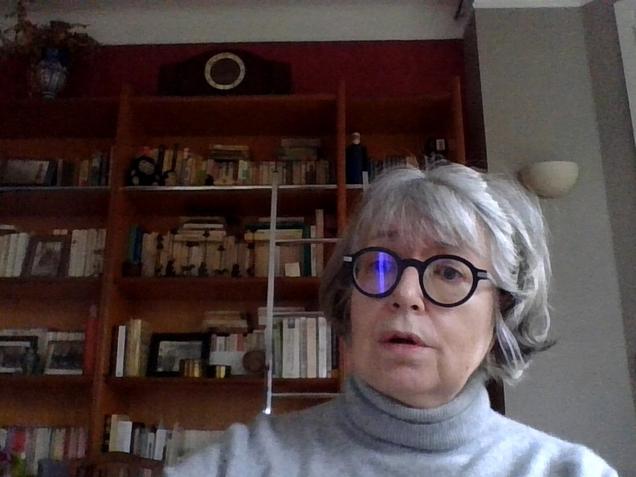Erfahrungsbericht von Thérèse R.

I am a retired teacher. I have successively worked as an English teacher (I have a degree in English), a specialized teacher, professor of Modern Languages and ended my career as a headteacher. I was born in Alsace but have a German name (ZAHM) because my father's family is of German origin. The oldest relative I found was from Saxony and migrated to Saar at the beginning of the 17th century. Some then settled in Lorraine and became French after the war. On my mother's side, I also have a German ancestor, my great-grandfather, born in the Black Forest, who completed his military service in Alsace, when this province was still German. He met my great-grandmother there, who was born French in 1868 before becoming German following the defeat of the 1870's war. Their daughter, my grandmother, an extremely kind woman. and whom I liked a lot, never learned French. I spoke Alsatian with her and wrote to her in German. She died in 1985. Since then, I haven't had the opportunity to use these Germanic languages, even though they were familiar to me. When I welcomed my son's German partner, I realized that I had forgotten a lot of vocabulary and expressions. I studied German as a second language in middle and high school. My father belived that English was much more important for work purposes than German. He had, moreover, been deported to Germany with his whole family in 1943, and had held a certain grudge against that country. Wunderbla was therefore an opportunity for me to rekindle with the German language, to review the syntax and the vocabulary in the hope of becoming more fluent in the language. However, I do regret my lack of speaking skills, as I struggle to chat with native speakers. I also take Spanish lessons with Hotel Borbollon, because I am married to a Spanish person and have some knowledge of the language due to frequent stays with my husband's family in Andalusia. I find Spanish conjugation, tenses and grammar very complicated and hope to be able to improve, especially regarding my speaking skills so I can chat with my in-laws. (FR) Je suis retraitée de l'éducation nationale : j'ai successivement travaillé comme maîtresse auxiliaire en anglais (j'ai une licence d'anglais), institutrice spécialisée, professeur de lettres moderne et ai fini ma carrière en tant que chef d'établissement. Je suis née en Alsace mais porte un nom allemand (ZAHM) car ma famille paternelle est d'origine allemande. Les plus anciens que j'ai découverts venaient de Saxe et ont migré vers la Sarre au début du XVII° siècle. Certains se sont ensuite installés en Lorraine et sont devenus français après la guerre de trente ans. Du côté maternel j'ai également un ancêtre allemand. Il s'agit de mon arrière-grand-père, né en Forêt Noire, qui est venu accomplir son service militaire en Alsace, lorsque cette province était allemande. Il y a rencontré mon arrière-grand-mère, née française en 1868 avant de devenir allemande suite à la défaite de 1870. Leur fille, ma grand-mère, une femme d'une extrême gentillesse et que j'aimais beaucoup, n'a jamais appris le français. Je parlais alsacien avec elle et lui écrivais en allemand. Elle est morte en 1985. Depuis, je n'ai plus guère eu l'occasion d'utiliser ces langues germaniques qui me furent pourtant familières et, lorsque j'ai reçu la compagne allemande de mon fils, je me suis rendue compte que j'avais oublié beaucoup de termes et d'expressions. J'ai étudié l'allemand au collège et au lycée en seconde langue vivante, mon père estimant que l'anglais était bien plus important pour entrer dans la vie active que l'allemand. Il avait, par ailleurs été déporté en Allemagne avec toute sa famille, en 1943, et avait gardé une certaine rancune contre ce pays. Wunderbla a donc été pour moi une occasion de revoir la langue allemande, de revoir la syntaxe et le vocabulaire dans l'espoir de retrouver une certaine fluidité en parlant cette langue. Je regrette néanmoins de ne pas être entraînée à l'oral, car je me rends compte que converser reste compliqué. Je prends également des cours d'espagnol avec Hotel Borbollon, car je suis l'épouse d'un Espagnol et baragouine cette langue du fait de fréquents séjours dans la famille andalouse de mon mari. Je trouve la conjugaison, la concordance des temps et la grammaire de cette langue très compliquées et espère pouvoir m'améliorer dans ces domaines, là encore pour pouvoir converser avec les membres de ma belle-famille.
— Thérèse R. (VAIRES SUR MARNE, FRANCE)